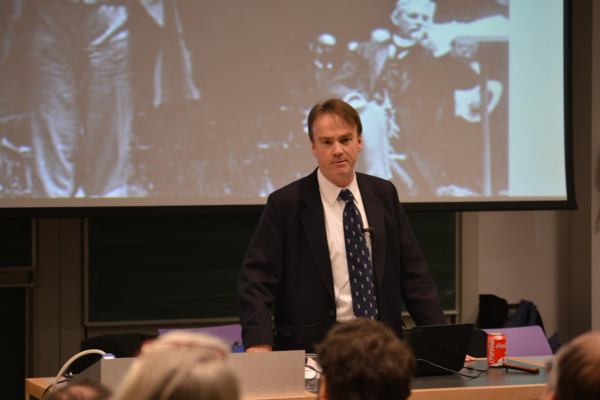
Professor at All Souls College (University of Oxford) and holder of the 2012/2013 Ganshof van der Meersch Chair, Kevin O’Rourke spent part of his youth in Brussels. In this interview, he remembers those years and gives an economic historian’s perspective on the Eurozone crisis.
You lived in Brussels back in the Seventies. What are your memories of the city at the time?
We moved here in 1973. I was ten at the time, so my memories of the city are childhood memories. We lived in Uccle and I went to the European School, in the very first English section. I remember playing soccer, first in the bois de la Cambre and in the Wolvendael park, then in an English club, the Eurobrits: an awful name, but a good club. I remember the car-free Sundays in 1973, when the oil crisis struck, and weekends spent picking mushrooms in Luxembourg with one of my Dad’s colleagues. It was a pleasant but slightly boring life, the typical life of a diplomat’s child.
And you left when you were…
Fifteen. Those five years in Brussels had a great effect on me.
What did Europe mean to you at the time?
It was very different. My father, for example, worked with people who had been on different sides during the war, whereas Ireland had been neutral. This is something that impressed me. I also remember that in 1974, when Pompidou died, the flags in our school were lowered to half-mast. A few months later the Irish president died and nothing happened. I went to the school principal, and he did what was necessary. Politics were often present in my childhood.
What was it like to mix with so many different nationalities? I felt European, and at the same time I realized what I was, and above all I realized that I wasn’t British, since so many got Britain and Ireland mixed up.
Let’s come back to the present. You are not a big supporter of the policies currently being enforced by EU leaders. Do you think a possible solution to the Eurozone crisis is the one advocated by Karl Wheman in his recent article “A Plea for growth to Europe’s politicians”?
As an economic historian, I believe current policies cannot work. Imposing deflationary adjustment on big countries like Spain and Italy can only end badly. What else can be done? In the short run, I see two possibilities. First, restructuring the debt of Greece, and probably also of Ireland, Portugal and some other countries. Nothing in the treaties forbids it. Then there is the European Central Bank and its monetary policy: nothing prevents the ECB from immediately lowering its interest rates and adopting a more expansionary policy. As Karl Whelan suggests, we could also try adopting a more expansive fiscal policy via the European Investment Bank, but I think this would be politically less feasible.
Is lack of political will the main obstacle?
No, I think the real problem lies elsewhere: there are people who honestly believe that current policies can work, even though it’s clearly impossible. Even in the Twenties, when our economies were less modern, deflationary adjustment didn’t work. There are many reasons for this. In the first place, nominal wages don’t fall, except in countries like Greece, which is on the brink of social explosion. In Ireland, for example, nominal wages haven’t decreased. And even if wages did decrease, this would increase the real burden of debt.
Is this situation the result of our inability to learn from history?
If these people had studied the history of the interwar period, they would see the danger of their policies. But this is also an ideological problem. Europe, which was originally a social-democratic project, has become a very liberal project as regards both macroeconomics and microeconomics. Its leaders reason like Chicago economists, and this is very dangerous. When the world goes through a Keynesian phase, as it is the case now, Keynesian policies are necessary.
Is the end of the euro a likely outcome?
No human institution is permanent. It would be a gross mistake to think that the euro doesn’t face this risk. What I hope is that, should the monetary union explode, we will succeed in maintaining the other elements of the European project, which is the most optimistic project of the postwar period. But if we let the problems in the periphery drag on too long, exit from the monetary union will be regarded as a liberation and not as a disaster. Europe will be considered as the enemy, and in that case anything could happen.
In January Ireland took over the EU presidency. It is too early to make an assessment, but what are your first Impressions of this presidency?
I support the cap on bankers’ bonuses negotiated by Ireland. The European Union should adopt more measures of this kind, which meet the requests of its citizens, instead of imposing austerity measures that only cause misery and unemployment.


